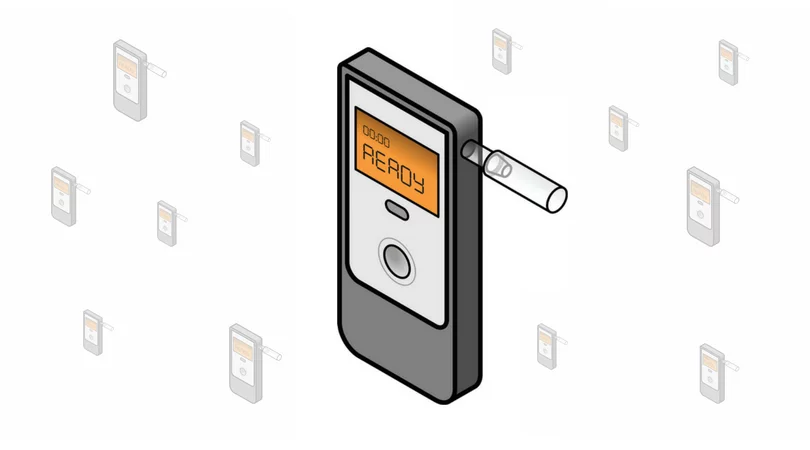Can You Be Convicted of DUI without a Breathalyzer?
So, can you be convicted of DUI without a breathalyzer test?
If you were arrested, it’s time to call an experienced DUI attorney.
When a police officer suspects you are driving under the influence, he or she will pull you over and request that you take a breathalyzer test.
According to California law, you have the right to refuse this request at this point but it’s important to understand the breathalyzer test is just one way for authorities to determine if you were intoxicated.
With that said, an experienced DUI attorney may still be able to present an argument in your defense.
Today, we’re taking a closer look at some of the other ways authorities can determine if you were driving under the influence as well as some of the arguments a lawyer may present in your defense.
Can You Be Convicted of DUI without A Breathalyzer?
The short answer is yes.
You can be convicted of a DUI without a breathalyzer test because it’s not the only way for authorities to determine that you have been driving under the influence of a controlled substance.
If you refuse to take a breathalyzer test during a traffic stop, the officer will likely perform a variety of other field sobriety tests and investigate the scene for additional evidence that you have been driving under the influence.
With that said, an experienced DUI attorney may still be able to present an argument in your defense.
Refusing the Breathalyzer Test
The state of California allows the authorities to request a breathalyzer test at two points during a DUI case:
- During the traffic stop (before the arrest) – This test is optional, so you can refuse it with no penalty.
- During processing (after the arrest) – This test is required by law, so you can face additional penalties.
If you decide to refuse the breathalyzer test after the arrest, you will be charged with a refusal offense, which carries the following penalties:
- Extra jail time
- Longer license suspension period
The penalties will vary depending on your criminal history driving under the influence.
- 1st DUI in 10 years: 48 extra hours of jail time + 1-year license suspension
- 2nd DUI in 10 years: 96 extra hours of jail time + 2-year license revocation
- 3rd DUI: 10 extra days in jail + 3-years license revocation
- 4th DUI: 18 extra days in jail + 3-years license revocation
Let’s say you refuse the breathalyzer test …
Unlike a breathalyzer test, a field sobriety test is not optional and may provide the evidence needed to arrest and convict you of driving under the influence. In addition, the officer will collect any other circumstantial evidence that can be used against you, including witness testimony and items from your vehicle.
The officer will then request a warrant from a judge to take a blood and urine sample from you at a dedicated location. If the sample reveals your blood contains a concentration of alcohol, medication, or cannabis, you can be convicted.
DUI Circumstantial Evidence
In California, the law says a fact may be proved by either direct evidence, circumstantial evidence, or a combination of both.
The police may find evidence in your car that indicates you have probably been drinking or consuming drugs – empty beer bottles or bottles of alcohol, etc. This circumstantial evidence can be used against you in court.
If you make any statements to the officer regarding the state of your mental or physical condition, this can also be used against you. If you said you “had a few beers” or “may have fallen asleep,” these are statements of admission. If you said you took some medication, this is also an admission of possible impairment.
Field Sobriety Tests
Another form of circumstantial evidence is a series of field sobriety tests that police officers may apply on the spot to see if you are impaired. For you to be convicted of DWI, the state must prove you are “appreciably impaired.” This means there is “noticeable impairment” that the officer will observe and record.
There is no standard formula for the officer to apply. It is a case by case situation. But there are some usual tests that are performed that have shown to reveal impairment in many cases.
They include the Horizontal Gaze Nystagmus Test (eye jerking test), the nine-step walk and turn, and the 30-second one-leg stand. These tests are supposed to correlate specific clues about possible blood alcohol levels. They have been found to be about 70% accurate in controlled studies.
In the eye-jerk test, the officer moves a pen or target back and forth several times to check your gaze. There is a standard number of passes although some officers tend to do more.
The nine-step walk and turn and the 30-second one-leg stand is often used to test divided-attention dexterity. They are actually difficult to perform for anyone, sober or not, without practice. In court proceedings, some attorneys will ask jury members to try these movements on their own during breaks.
There is another test sometimes performed, called the Romberg test. In this test, you are asked to stand with your feet together, tilt your head back slightly, and close your eyes for about 30 seconds. The validity of this test is often called into question because many older adults and people with certain diseases or afflictions have difficulty with balance even without alcohol.
Implied Consent, Loss of License
One big problem with refusing to take the breathalyzer test is the automatic loss of license in most states. In these states, it is recognized that you accepted responsibility (for taking a breathalyzer test) when you signed an application for a license. This is called the “Implied Consent” statement.
As most people, experts and those with experience related, the refusal to take a breathalyzer test is an automatic loss of license in most, if not all, states in the United States. In these states, there is a requirement that you knowingly, or unknowingly, accept when you sign an application for a license. This requirement is known as the “Implied Consent” statement.
In addition to the loss of license, points are added to your driver’s license. These penalties vary from state to state but the loss of license is usually for one year, and the number of points is two. Your refusal is stated on your driver’s record for a state-mandated number of years, usually five.
An Attorney Will Present An Argument In Your Defense
If you have been arrested and charged with DUI, it is wise to hire an attorney.
There are many defense arguments that an experienced attorney can present for you. Here are some examples of defense positions that can be used in California if you were not given a breathalyzer test.
“Rising blood alcohol” is a defense that is based on the timing of a blood (or breath) test for alcohol. It takes between one and three hours for alcohol to be absorbed into your system. So, depending on when the test was performed, your blood alcohol content (BAC) could show a higher level than it was when you were driving.
There are several ways your blood test can be ruled invalid. Your attorney can make a “blood split motion” to find out more about how your blood test was performed and how your test results were stored.
Title 17 of the California Code of Regulations has specific requirements for collecting, analyzing, and storing blood samples. If these requirements are not followed, your test can be ruled invalid.
The arresting officer must have had “probable cause” to pull you over. If arrested and interrogated for possible incriminating evidence, you should have had your “Miranda Rights” explained to you.
If you were stopped at a “California Sobriety Checkpoint,” there are certain rules that must be followed by authorities. It must be a publicly advertised DUI roadblock. There must be a supervising officer on hand. And officers in the field must follow a preset formula for stopping cars.
There are many other challenges that a qualified attorney can make on your behalf including those related to field sobriety tests, blood chemicals, mental impairment, distracted driving vs. DUI, and many more.
So, even if you refuse to take that breathalyzer test, there are several other ways you can be convicted of DUI. And there are several defenses you can make against a DUI charge. An attorney knows both sides and is your best chance to avoid fines or jail time.
Are you in search for a certified attorney to represent you?
Let us help you find one today!



